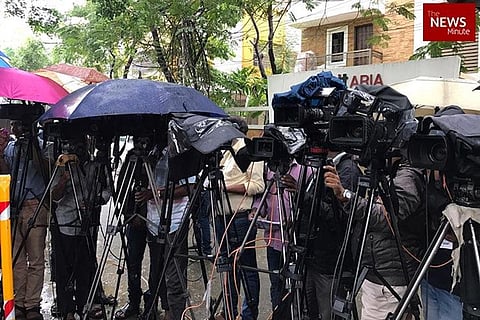

Noting that media was gradually losing its "credibility and integrity", the Parliamentary Standing Committee on Communications and Information Technology on Wednesday, December 1 recommended setting up of a 'Media Council' with statutory powers to check "irregularities" in print, electronic and digital platforms.
Headed by senior Congress leader Shashi Tharoor, the Committee also expressed concern over the "disturbing trend" of fake news and asked the Ministry of Information and Broadcasting (MIB) to pursue the Ministry of Law and Justice for early implementation of the recommendation of the Law Commission to make paid news as an electoral offence, so that it has a deterrent effect on the incidents of paid news.
In its report on 'Ethical Standards In Media Coverage', submitted in Parliament on Wednesday, the Committee also suggested the creation of a Media Commission comprising experts for wider consultations amongst the interested groups/ stakeholders to evolve a consensus on setting up of the Media Council.
The Committee called for the Media Commission to look into all the complex issues concerning the media and submit its report to the Committee within six months of its inception.
"The Committee has noted that 'Media' which was once the most trusted weapon in the hands of the citizenry in our democracy and acted as trustees of the public interest is gradually losing its credibility and integrity where values and morality are being compromised," it said.
It said existing regulatory bodies like the Press Council of India and the News Broadcasting Standards Authority are not as effective, that their "efficacy is limited".
PCI, a statutory body governing the print media, may entertain complaints and is empowered to warn, admonish or censure newspapers, news agencies, the editor or the journalist concerned, however, it does not have the power to enforce compliance as advisories issued by PCI are not enforceable in a Court of Law, the Committee said.
It also noted that NBSA governing news broadcasting has the power to fine, but its jurisdiction extends to only those organisations that choose to be members of the News Broadcasters' Association and added that its "efficacy is limited" and depends on voluntary compliance with its orders.
"In view of the above, the Committee has opined that the MIB should explore the possibility of establishing a wider Media Council encompassing not just the print media but the electronic and digital media as well, and equip it with statutory powers to enforce its orders where required."
"This would enable it to have a holistic view of the media scenario and take appropriate steps to check irregularities, ensure freedom of speech and professionalism, and maintain the highest ethical standards and credibility, which are so critical for the fourth pillar of democracy," it recommended.
Meanwhile, pending a decision on this, the Committee has asked the MB to look into the possibility of expanding the regulatory framework to monitor e-newspapers.
The Committee also expressed its dismay on PCI not being given information with regard to action taken on their forwarded decisions by the concerned state governments/UTs, adding that "it clearly indicates the limitation of the powers of the PCI to penalize the newspapers and news agencies, etc., for violation of the norms of journalistic conduct."
Thus, the Committee has opined that rules and regulations framed under the Press Council Act, 1978 have no meaning unless there exists an effective mechanism for their efficient implementation, the report said.
"Therefore the government should take comprehensive and practical measures so that PCI's decisions on cases of violation of ethics in newspapers and other publications, are genuinely implemented or taken to their logical end and it should be incumbent upon the concerned state government/UT to inform PCI about the action taken", it said.
On fake news, the committee said it has become a "disturbing trend in India, where the contributors of content are not only owners of websites, but also individual subscribers, on whom exercising control is posing a very big challenge."
While appreciating the establishment of Fact Check Units in 17 Regional Offices of PIB, the Committee asked the MIB to open more such FCUs to remain vigilant for viral videos/news which could create public disorder.
The Committee has also recommended that the term Fake News should be broadly defined.
The Committee also endorsed the views of the CEO, Prasar Bharati that the regulatory mechanisms should look at embracing the latest technologies such as Artificial Intelligence to check fake news and to be able to intervene in near real-time.
"Hence, there is a need to take suitable steps accordingly and also to factor in the existing expertise in the domain of news fact check through non-Government agencies such as 'AltNews', 'check4spam', 'SMHoaxslayer' etc," it said.
Observing that countries like Australia, Malaysia and other democracies have Anti-Fake News Laws, the Committee has asked the Ministry to study their laws and develop some legal provisions to counter as big a challenge as fake news.